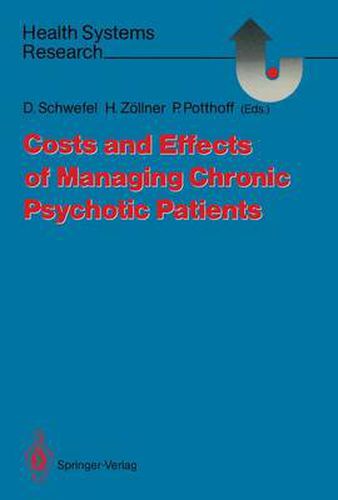Readings Newsletter
Become a Readings Member to make your shopping experience even easier.
Sign in or sign up for free!
You’re not far away from qualifying for FREE standard shipping within Australia
You’ve qualified for FREE standard shipping within Australia
The cart is loading…






This title is printed to order. This book may have been self-published. If so, we cannot guarantee the quality of the content. In the main most books will have gone through the editing process however some may not. We therefore suggest that you be aware of this before ordering this book. If in doubt check either the author or publisher’s details as we are unable to accept any returns unless they are faulty. Please contact us if you have any questions.
Since the early 1970s, delivery of care to people who are consid- ered to suffer from chronic psychotic disturbances has been at a crossroads. In 1983, the European Regional Office of the World Health Organization (WHO), within its health economics pro- gramme, encouraged international research on the economic impli- cations of alternative strategies of care for those patients. Origi- nally, it was intended to compare at least two or more strategies of managing chronic psychotics, especially strategies which place dif- ferent emphasis on inpatient and outpatient care. Instead of designing a fully coordinated, multinational, multi- centre study based on a mutually agreed on study protocol, we de- cided on the following: - To meet with researchers interested in the social, psychological, and economic features of health care for chronic psychotic pa- tients - To stimulate ongoing research projects or to initiate new ones - To discuss quite different approaches from international and - terdisciplinary points of view - To review and revise the diversified end products of such an open research process For this purpose, we outlined a broad range of topics which could be included in the study: - Methodological problems of evaluation in this field - Social and economic implications of psychiatric deinstitutiona- zation - Scenarios of various degrees of deinstitutionalization - Assessment of (hospital) costs of the treatment for chronic sc- zophrenic and other psychotic patients - Public and private costs of the main treatment strategies - Time-expenditure analyses of chronic psychotic patients
$9.00 standard shipping within Australia
FREE standard shipping within Australia for orders over $100.00
Express & International shipping calculated at checkout
This title is printed to order. This book may have been self-published. If so, we cannot guarantee the quality of the content. In the main most books will have gone through the editing process however some may not. We therefore suggest that you be aware of this before ordering this book. If in doubt check either the author or publisher’s details as we are unable to accept any returns unless they are faulty. Please contact us if you have any questions.
Since the early 1970s, delivery of care to people who are consid- ered to suffer from chronic psychotic disturbances has been at a crossroads. In 1983, the European Regional Office of the World Health Organization (WHO), within its health economics pro- gramme, encouraged international research on the economic impli- cations of alternative strategies of care for those patients. Origi- nally, it was intended to compare at least two or more strategies of managing chronic psychotics, especially strategies which place dif- ferent emphasis on inpatient and outpatient care. Instead of designing a fully coordinated, multinational, multi- centre study based on a mutually agreed on study protocol, we de- cided on the following: - To meet with researchers interested in the social, psychological, and economic features of health care for chronic psychotic pa- tients - To stimulate ongoing research projects or to initiate new ones - To discuss quite different approaches from international and - terdisciplinary points of view - To review and revise the diversified end products of such an open research process For this purpose, we outlined a broad range of topics which could be included in the study: - Methodological problems of evaluation in this field - Social and economic implications of psychiatric deinstitutiona- zation - Scenarios of various degrees of deinstitutionalization - Assessment of (hospital) costs of the treatment for chronic sc- zophrenic and other psychotic patients - Public and private costs of the main treatment strategies - Time-expenditure analyses of chronic psychotic patients